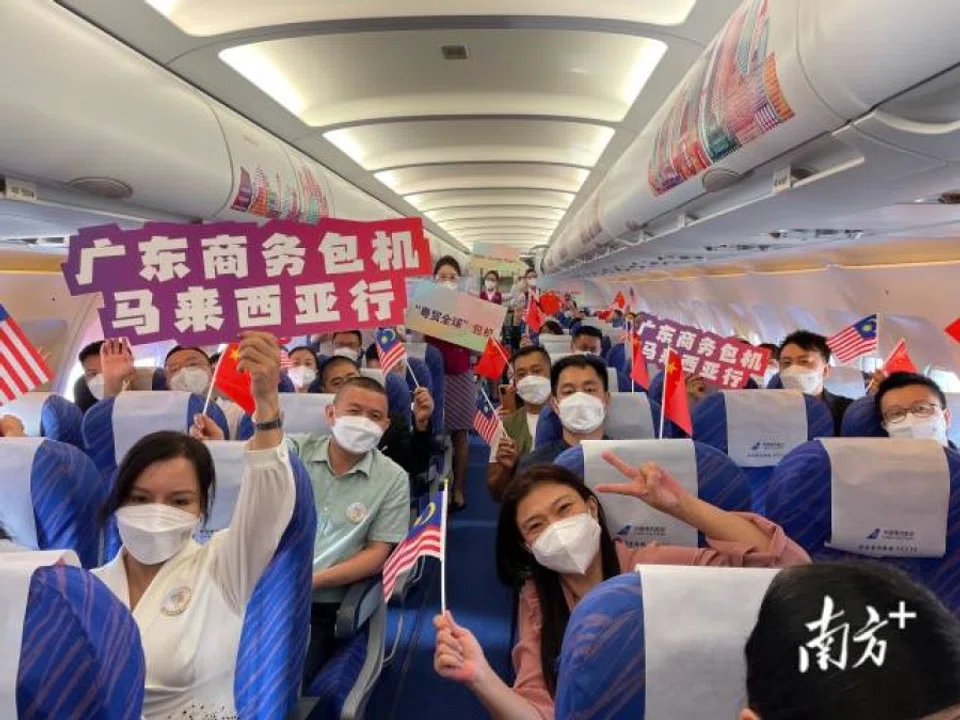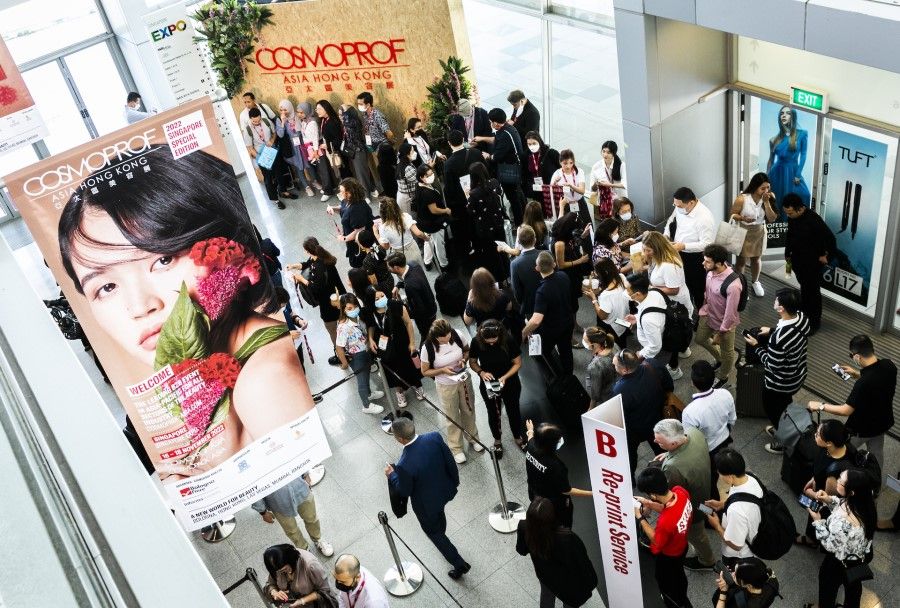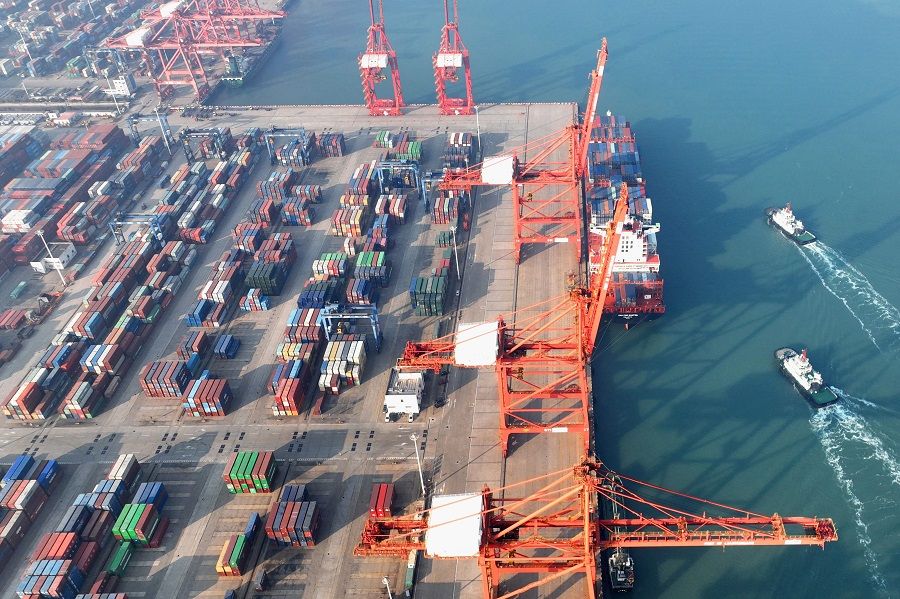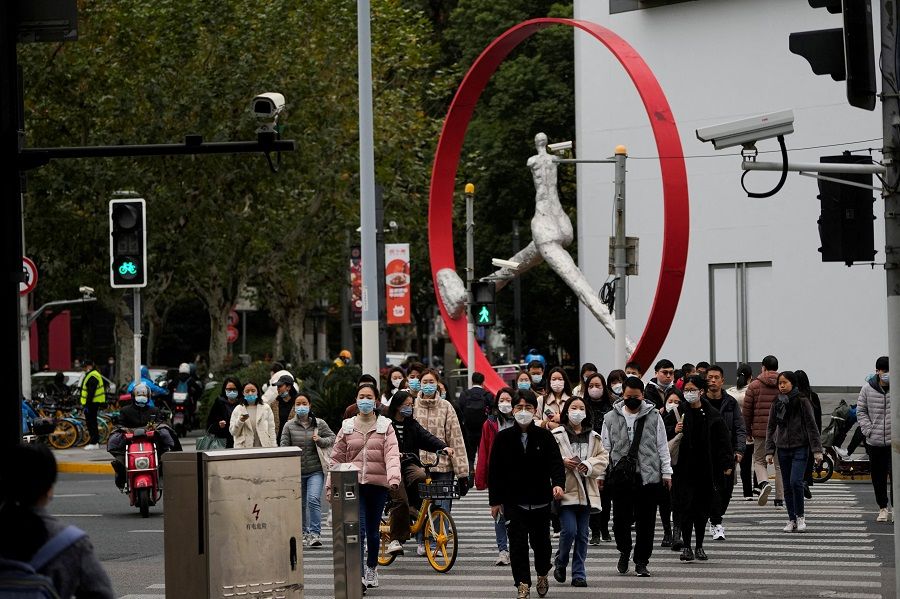China is sending out trade delegations in full force

As international travel recovers and foreign trade pressure grows, local governments in China are organising trade delegations for "revenge overseas trips" to fight for orders and investments, marking a shift in local efforts from controlling Covid to stabilising the economy.
Chinese media has reported that since September, Chinese provinces and cities have organised over 300 trade delegations to go overseas for trade fairs and study trips, many involving local governments chartering flights and leading company groups - two major destinations are Europe and Southeast Asia.
Guangdong sends 160-person delegation to Singapore for beauty fair
The person in charge at the Department of Commerce of Guangdong Province told Lianhe Zaobao that in the second half of September, they organised the first delegation to a lighting fair in Frankfurt, Germany, where the results were "better than expected". Subsequently, there were another three chartered flights to take part in overseas fairs in Germany, Malaysia, Singapore and the UAE.
Cities like Shenzhen and Dongguan have also organised trade delegations to open up overseas markets.

Cities like Shenzhen and Dongguan have also organised trade delegations to open up overseas markets. Zaobao understands that Dongguan plans to bring companies to nearly 50 overseas trade fairs in the first half of next year.
In November, Guangdong sent a 160-person delegation from 69 companies to the Cosmoprof Asia beauty fair in Singapore, including beauty product manufacturers, trade companies and brand companies. During their seven-day stay, many companies got the orders they wanted, and contacted potential clients from Southeast Asia and Europe.
Wu Jiang, chairman of Beauty Yaurient Cosmetics Accessories (Shenzhen), was one of the businessmen who came to Singapore to take part in the fair. He told Zaobao that during the fair, the company saw over 80 purchasers and got to know many buyers from Southeast Asia. This allows the company to have a more direct sense of what clients need, and provides an opportunity for face-to-face discussions on how to improve its products. "This is something that is difficult to resolve through online fairs or telephone conversations."
Besides Guangdong, major coastal trade provinces Zhejiang and Jiangsu have also drummed up "protection of overseas trade".
Wu says frankly that pre-Covid, the company took part in four overseas fairs a year. "In the three years of the pandemic, overseas fairs all stopped, which had a huge impact on overseas trade businesses like us. Especially since the international economy has not been too good this year, overseas demand has weakened and all the more the government and enterprises have to come together, with the government providing platforms and opportunities for businesses to actively leverage."

After a fruitful Singapore trip, Wu plans to go to Italy, the US, Japan and Hong Kong next year, and continue to contact new and existing clients, to "get more overseas orders, so that overseas trade production can recover quickly from the current winter".
Besides Guangdong, major coastal trade provinces Zhejiang and Jiangsu have also drummed up "protection of overseas trade". This month, Zhejiang launched a campaign for delegations and companies to open up markets and fight for orders, with the first stop in France and Germany. Suzhou in Jiangsu also organised a delegation of over 200 people this month to France and Germany for promotional events to gain business. Some inland provinces quickly followed - this month, Sichuan organised a 40-person trade delegation to Europe, while the Department of Commerce of Hunan Province visited trade associations and companies in Singapore during the same period.
Feeble external demand, reduced orders
Behind this trend of fighting for export orders is the growing downward pressure on China's foreign trade industry. Exports contracted 8.7% year-on-year in November after shrinking 0.3% in October, marking the biggest plunge since February 2020. Inbound shipments also fell by 10.6% from a 0.7% drop in October, the worst performance since May 2020.
Major coastal provinces took the brunt of the pandemic and feeble external demand. Major economic provinces such as Guangdong and Jiangsu only saw a GDP growth of 2.3% in the first three quarters of the year, which is below the national average of 3%. Ningbo Daily reported this month that existing and new orders of local foreign trade companies have contracted six weeks in a row, while exports to the US have fallen by over 10% for three consecutive months.
...it is also important to organise overseas trips to show foreign investors that the country that has been isolated for the longest time in the world is returning to normalcy. - Chen Bo, director of the Optical Valley Institute for Free Trade

Chen Bo, director of the Optical Valley Institute for Free Trade, told Zaobao that following weakening external demand, export orders are expected to continue to decrease, while competition for orders will become more intense. This means more competition not only externally, but also with domestic enterprises from other Chinese regions, leading various coastal provinces to quicken their plans for overseas outreach.
Chen also reiterated that, compared to the service and retail industries, the foreign trade industry has been least affected by the pandemic. In fact, the hastened speed in going overseas is a return to the pre-Covid mode of strengthening the economy. He explained, "In the early stages of reopening, apart from media publicity, it is also important to organise overseas trips to show foreign investors that the country that has been isolated for the longest time in the world is returning to normalcy."
Huachuang Securities Co. chief macro analyst Zhang Yu wrote in an article that China's adjustment of its Covid-19 response since November has paved the way for enterprises to start going overseas. Most enterprises began stepping out of China in mid-November. After sweeping changes to the country's Covid restrictions were made in early December, seven prefecture-level cities and two provinces organised their overseas trips.
In the face of growing economic pressure, the Chinese Communist Party's Politburo said that work will be done to "boost opening up at a higher level and to further attract and make good use of foreign investment" to ensure that "officials and enterprises dare to make decisions on their own while local authorities and residents dare to blaze new trails" when they met on 6 December. Zhang thinks that the meeting sent a strong signal to local governments that more efforts will be directed at strengthening the economy and stabilising growth, which would prompt them to shift the focus of their work from pandemic containment to economic development.
The import and export trade between China and the world will not be optimistic next year.

While various regions are striving to strengthen foreign trade, Chen predicts that the improvements made on the supply side of China's imports and exports will be offset by the negative effects of the demand side. As the US government steps in to curb inflation, the economies of US-led Western countries are likely to weaken, which in turn will lead to shrinking demand. The import and export trade between China and the world will not be optimistic next year.
On the other hand, investment and cooperation programmes that were previously stalled as a result of stringent Covid restrictions are expected to restart following China's reopening. Chen said, "Although the recent surge in Covid cases has impacted the economy, foreign investments are quickly pouring into China instead. Investors are set to actively resume business activities with China next year, and promote a significant rebound in foreign investment."
This article was first published in Lianhe Zaobao as "重心从防疫转向稳经济 中国多地政府包机带领商团出海抢订单".
